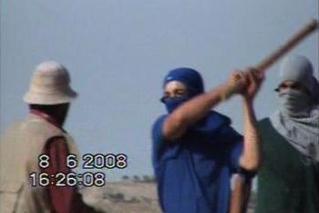 Photo by Muna A-Nwajaa, B'Tselem camera project
Photo by Muna A-Nwajaa, B'Tselem camera projectTomorrow (Thursday, 5 January 2012) the Knesset’s Constitution, Law, and Justice Committee is scheduled to hold an expedited discussion regarding law enforcement in the Occupied Territories. This discussion was requested by MKs Shlomo Molla (Kadima), Uri Ariel, and Arieh Eldad (National Union). The Association for Civil Rights in Israel (ACRI) has called upon Members of Knesset to demand that law enforcement authorities in the Occupied Territories work to enforce the law against all those who violate it, without discrimination, and to demand that the government allocate all the necessary means, tools, and personnel to achieve this end.
In a position paper sent by ACRI to members of the committee on Sunday, ACRI notes that it and other human rights organizations have been sounding repeated warning calls for many years now, regarding severe damages to person and property caused by Israeli citizens mostly to Palestinians in the Territories.
“One of the primary obligations incumbent on the military commander of an occupied area with regard to its protected residents is the need to maintain public law and order in the area under his control (Regulation 43 of the Hague Regulations); and to ensure the well-being of the local residents and protect them, particularly against violence and threats of violence (Article 27 of the Fourth Geneva Convention). This is also required by Israeli law, including the explicit ruling established by the Court in HCJ 9593/94 Rashid Murar v Commander of IDF Forces in the Judea and Samaria Area (dated June 26, 2006).
“Although the Israeli and international law on this matter are clear; despite the report and recommendations of the comptroller of the security system on this subject (from 2007); although the Attorney General has issued explicit instructions regarding law enforcement against Israelis in the Territories; and although the Legal Advisor for the Judea and Samaria Area has issued a series of instructions on the subject – the law enforcement authorities, including the security forces, continue to show a lack of determination in preventing violence and lawbreaking,” states ACRI’s position paper.
According to data collected by the organization Yesh Din, only 7.5% of investigations opened regarding offenses committed by Israelis against Palestinians in the Occupied Territories are followed through to an indictment. The majority of these investigations, nearly 90%, end in closing the case for reasons that suggest a failure of the investigation – “unknown offender,” “lack of sufficient evidence,” and lost case files. The failure rate is particularly high in investigations that deal with damage to property – 97% of those are closed for reasons suggesting failure of the investigators.
According to Attorney Debbie Gild-Hayo, ACRI’s Director of Policy Advocacy, “recently we have been hearing claims, which are also implied in the statements made by MKs Eldad and Ariel, as though there exists discrimination against settlers or Israelis in general in the enforcement of law in the Occupied Territories. However, the facts show a completely opposite reality. At the same time, recent media publications do suggest that following the last wave of settler violence, Israeli authorities have decided to employ infringing enforcement methods – such as administrative arrest and restraining orders, preventing defendants’ right to review the prosecution material, and so on. We believe that such methods must not be used against anyone – neither Palestinians nor Israelis. Law enforcement must be done in a manner that ensures the rights of suspects and defendants to dignity, freedom, and a due process.”







